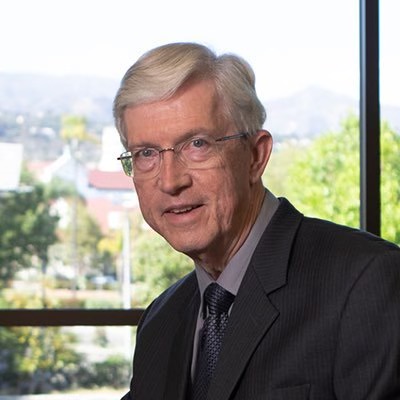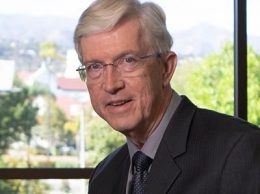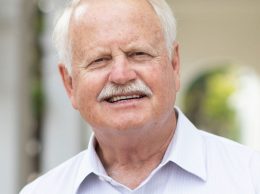Green Hills Software founder launches run for U.S. Senate
IN THIS ARTICLE
- Latest news Topic
- Jorge Mercado Author
By Jorge Mercado Thursday, April 21st, 2022
Dan O’Dowd has been a staple of the Santa Barbara business community for decades, founding Green Hills Software in 1982 and building it into a multimillion-dollar company.
Now he has his sights set on something bigger: the United States Senate.
O’Dowd announced April 19 that he is running for a Senate seat from California. He will be running against current U.S. Sen. Alex Padilla, a Democrat who was appointed to the position by Gov. Gavin Newsom after Kamala Harris left the Senate to become vice president.

O’Dowd told the Business Times he is a registered Democrat but will not be running as one. The June 7 primary in California is a “top-two primary,” meaning the two top vote-getters will advance to the November general election, regardless of political party, and candidates do not have to declare a party preference on the ballot.
O’Dowd, 62, is running on a single-issue platform, focusing on “making computers safe for humanity.” He has specifically mentioned Tesla as an issue, citing alleged deficiencies in its assisted driving technology. Tesla did not respond to an email seeking comment.
A veteran of the software industry for over 40 years, O’Dowd graduated from the California Institute of Technology in 1976 and has created software that “never fails and can’t be hacked,” according to his campaign website.
Green Hills Software has created the secure operating systems for projects including Boeing’s 787s, Lockheed Martin’s F-35 Fighter Jets, the Boeing B1-B Intercontinental Nuclear Bomber, and NASA’s Orion Crew Exploration Vehicle.
“Over the past years, we’ve been busy taking everything we have and putting computers in charge of it. Every device we have is now computer controlled and sadly, much of that software is very poor quality,” O’Dowd told the Business Times on April 20.
He argues that connecting the power grid, hospitals, millions of cars and other major industries to the internet with software “riddled with bugs and security defects,” has turned these systems into “potential weapons of mass destruction at the mercy of hackers.”
“The big issue is we are sitting here vulnerable to an attack from either hackers or from nation states, and we need to fix that and we aren’t,” O’Dowd said. “At best, we’re rearranging the deckchairs and chairs on the Titanic. Some feel good about legislation here and there, but none of it actually fixes it. I want to fix it.”
O’Dowd said he has brought the matter up with many government officials, including regulators and politicians, but “the movement has been glacial at best.”
It’s why he decided to run for office.
“Elections give us a way to measure things, and I’m basically arguing that this is the most important problem,” O’Dowd said. “I’m going to try to make people … understand that we have built this system with cruddy software that has terrible problems, and we need to fix it, and they need to demand it.”
Asked if he is serious about winning the election, or if this is just a way to get his message out more broadly, O’Dowd said, “If people believe in me, then they can vote for me. And if I get the most votes, everybody’s going to take notice that this is an issue that matters to people or at least, that when brought to their attention, it’s an issue that matters to them.”
O’Dowd has particular disdain for Tesla and its driver assistance software. He said Tesla CEO Elon Musk has been “reckless” in releasing cars that are marketed as self-driving without being able to safely drive themselves.
A study done by the Dawn Project, created by O’Dowd and meant to highlight the issue with poor software, showed that Tesla’s full self-driving mode malfunctions once every eight minutes in city streets.
The study also found that on average, every 36 minutes of driving a safety defect in the Tesla Full Self-Driving software causes a malfunction in the steering, braking or throttle that if not corrected by the driver would likely cause an accident.
“Why are we putting this software into cars and having it drive when it couldn’t get a driver’s license? Because Tesla didn’t ever ask anybody. No regulations. There’s nothing. They just wrote this code, they put it on the road and they are selling it for $12,000,” O’Dowd said.
Currently, O’Dowd is running campaign commercials in which drivers are using Tesla’s self-driving feature and have to take over after the car after making dangerous decisions. This includes running stop signs or red lights, making contact with an object that could have been avoided or making dangerous turns that endanger other drivers.
O’Dowd said he has never used Tesla’s self-driving feature and did not disclose how much money he has spent on the campaign so far, which includes those commercials.
Though Green Hills Software has an automotive division, O’Dowd said the company does not do self-driving software. Its software allows companies to “make their software more reliable.”
Some of those companies might be working on self-driving software, but Green Hills is not involved in that market, O’Dowd said.












